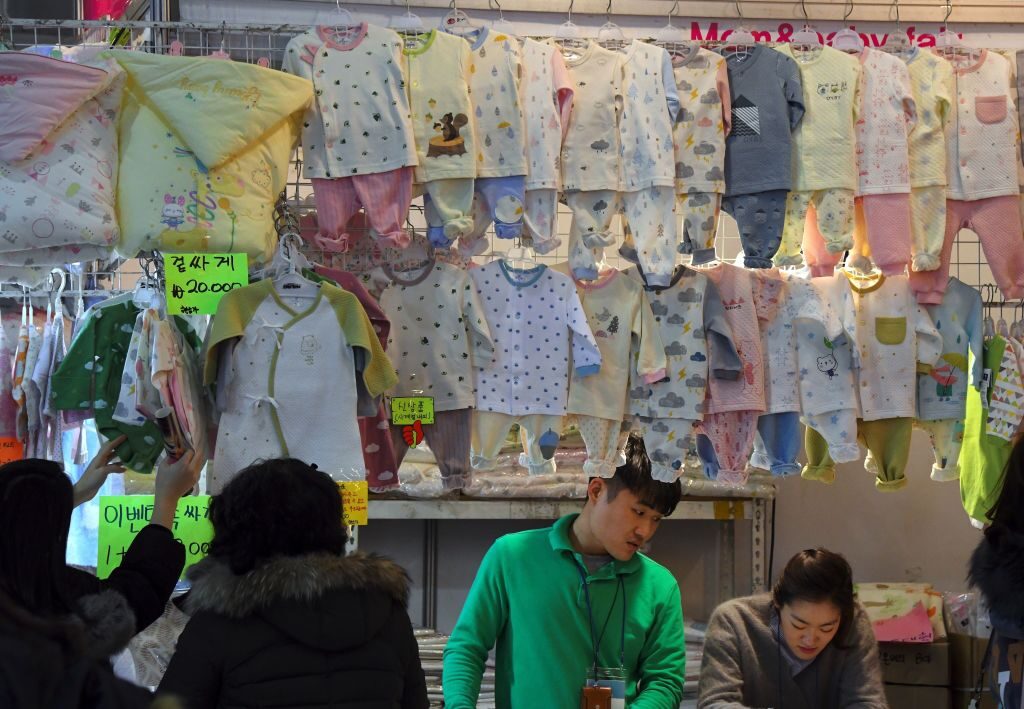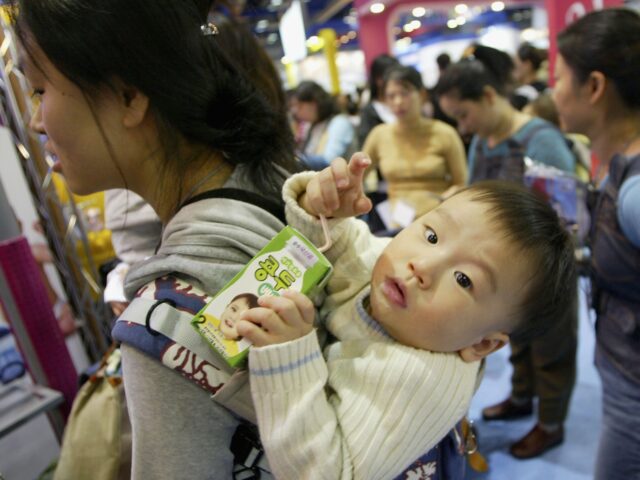A study published Wednesday revealed that Seoul, South Korea, lost one in ten of its pediatric clinics in the last five years, a dramatic reduction largely attributed to the nation’s catastrophically low birth rate.
South Korea has the world’s lowest fertility rate as of 2022: 0.78 children per woman throughout her childbearing years, down from 0.81 in 2021 and well below the 2.1 children per mother demographers believe necessary for any country to maintain its current population.
A study published last year suggested that South Korea will lose over half its population by 2100 if fertility rates remain as they currently are. South Korea is believed to currently be home to about 52 million people.
The firm Statistics Korea found in data published in April that the nation’s birth rate is continuing to rapidly decline throughout 2023 despite the government of conservative President Yoon Suk-yeol lifting most of the country’s coronavirus civil rights restrictions – which naturally prevent socialization, hindering dating and marriage – and calling for the nation to prioritize stabilizing its population.
“Only 19,939 babies were born in February this year, down 3.7 percent from a year earlier, according to the data from Statistics Korea. It marked the lowest number for any February since the statistics agency started compiling monthly data in 1981,” the South Korean news agency Yonhap reported.
The birth rate collapse is rapidly changing the social fabric of the country. Pediatric offices are among the services most affected.

File/This picture taken on December 21, 2017 shows baby clothes displayed on a booth at a baby fair in Seoul. Rapid economic growth over several decades has seen South Korea’s GDP boom, but birth rates have gone in the opposite direction. (JUNG YEON-JE/AFP via Getty Images)
According to the Korea Herald, citing the Health Insurance Review and Assessment Service of the country, Seoul is currently home to only 465 pediatric clinics for its 9.7 million people. In 2017, the capital had 521 such clinics, meaning it lost 12.5 percent of its clinics in five years.
The Herald noted that pediatricians began sounding the alarm this year, complaining that the government suppressing the price of pediatric services meant that doctors needed more patients to stay in business – but with the birth rate in rapid decline, finding children to tend to is increasingly onerous. The newspaper quoted the head of the Korean Pediatric Association, Lim Hyun-taek, warning in March that doctor fees are such that each hospital with pediatric services would need to see 80 children a day to generate enough funding to stay afloat, but the country simply does not have enough children for the math to work.
The Herald noted that Seoul saw a boom in psychiatric clinics in the same five-year time frame.
The Korean JoongAng Daily noted in a report in March that Seoul also appears to be losing kindergartens. While expensive English-language kindergartens in areas such as the pricey Gangnam district of the capital are multiplying, “the number of ordinary kindergartens in Seoul shrunk from 888 in 2015 to 788 in 2022, down 11 percent, data from the Korean Educational Development Institute showed.” JoongAng described the dwindling number of kindergartens teaching Korean children in the Korean language in Seoul as “alarming.”
Yoon, the president, has made increasing the birth rate a priority for his administration, ordering his cabinet in MArch to develop “bold measures” to encourage couples to build families.
“Please come up with bold and sure measures for the low birth rate so that they can be felt by the people,” presidential spokesperson Lee Do-woon quoted Yoon as saying at the time.
Some of South Korea’s largest companies responded to the call, increasing benefits such as parental leave, shortened work hours for pregnant women, in-house day care facilities, and in some cases evening funding IVF procedures for would-be parents. JoongAng Daily described Lotte, Samsung, and Hyundai as those increasing parental benefits. In remarks to the newspaper, the finance company Posco Holdings, which paid for an IVF procedure for an employee’s wife and whose CEO visited the new mother and her quadruplets with gifts in April, emphasized the importance economically for the country to have a viable next generation.
“We recognize that Korea’s low birthrate is a pressing and significant issue that not only the government but also companies must work together to solve,” the spokesperson said. “Posco declared ‘Corporate Citizenship’ as its management philosophy in 2018, and has since held conferences related to population and improved related welfare systems.”
“The declining population will not only lead to a decrease in the workforce, but also a contraction in the domestic market,” JoongAng noted.
One major challenge to reversing the fertility trend is Korean society’s growing hostility to children. A poll published in March showed that only a little more than half of Korean women were willing to give birth. “No-kid zones” – cafes, restaurants, and even libraries and museums that ban children – are increasingly prevalent nationwide, discouraging the existence of families in public life. The Jeju Research Institute estimated that about 500 public spaces in South Korea that would normally be considered spaces for children, not including bars or nightclubs, have declared themselves “no-child zones.”
The “no-child” trend has inspired some pushback. In May, an image on Korean social media showed a cafe with a sign posted banning seniors over the age of 60, reportedly a response to older men sexually harassing its baristas. More directly, South Korean lawmaker Rep. Yong Hye-in protested by bringing her toddler to the Korean National Assembly.
“Today, popular cafes and restaurants on Instagram and even public libraries have become ‘no kids zones,’” Yong said, carrying her son on her arm. “We must abolish these zones starting with public venues. There are so many cases where these public venues adopt the rules with lack of reasonable grounds including the National Library of Korea.”
“What we want is a society that embraces not only the fast and the competent, but also the slow and the inexperienced. In order to overcome one of the lowest fertility rates in the world, we must overhaul the society that rejects children and the elderly,” she declared.

COMMENTS
Please let us know if you're having issues with commenting.